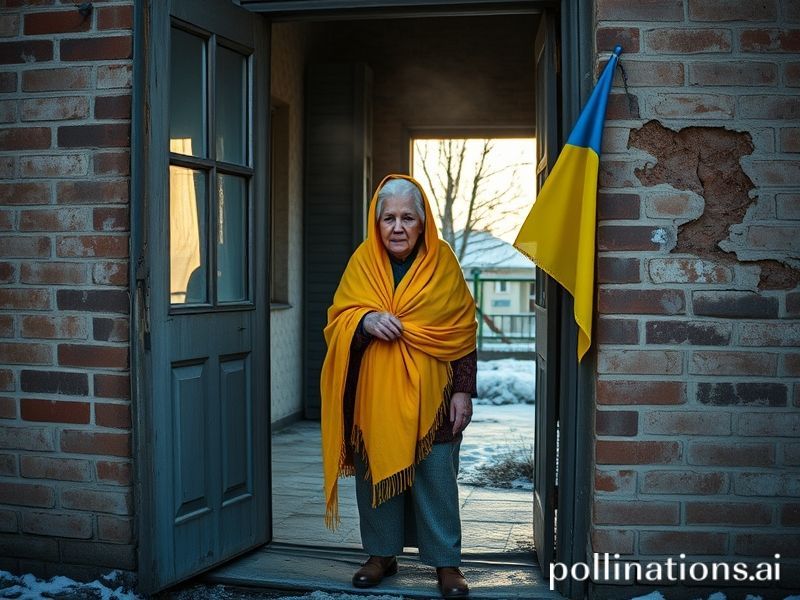Ukraine: The World’s Most Expensive Proxy War and the Geopolitical Theater Nobody Can Stop Watching
**The World’s Most Dangerous Reality Show: Ukraine’s Geopolitical Theater**
Two years into Europe’s most unnecessary war since someone decided the Habsburgs needed a slight nudge in 1914, Ukraine has become the planet’s most depressing reality television series—except the contestants can’t vote themselves off the island, and the producers are nuclear powers with questionable impulse control.
From the marble halls of Brussels to the climate-controlled war rooms of Washington, Ukraine has transformed from a country most Americans couldn’t find on a map into the world’s most expensive foreign policy experiment. The bill currently runs at approximately $174 billion and counting, which makes it either the most generous humanitarian intervention in modern history or the Pentagon’s most elaborate money-laundering operation, depending on your preferred conspiracy theory.
The international community—that mythical beast that supposedly exists between UN cocktail parties and G7 photo opportunities—has discovered that supporting democracy is considerably more complicated than retweeting hashtags. European nations, suddenly remembering they have actual militaries buried under decades of budget cuts, are shipping weapons to Ukraine with the enthusiasm of teenagers buying their first car with their parents’ credit card. Germany’s leopard tanks, Britain’s Challenger missiles, and America’s increasingly creative accounting methods have turned Ukraine into the world’s largest arms bazaar, complete with the minor inconvenience of actual people dying.
Meanwhile, the Global South watches this European melodrama with the weary expression of someone who’s seen this episode before. African and Asian nations, having endured their own proxy wars during the Cold War’s greatest hits, recognize the familiar pattern: white people arguing over borders while everyone else pays the price in food shortages, energy crises, and the sudden disappearance of wheat from global markets. The United Nations General Assembly votes have become an annual exercise in diplomatic theater, where nations pretend their votes matter while privately calculating how to maintain access to Russian fertilizers and Ukrainian grain.
China, ever the opportunistic bystander, has positioned itself as the war’s most profitable spectator. While lecturing everyone about sovereignty and territorial integrity—lessons apparently learned from their own peaceful activities in the South China Sea—Beijing has become Moscow’s economic lifeline, buying discounted oil and gas with the enthusiasm of a Black Friday shopper. The supposed “no-limits partnership” has revealed its actual limits: China will support Russia right up until Western sanctions threaten their bottom line, proving that capitalism remains undefeated even among communists.
The war’s ripple effects have transformed global geopolitics into a giant game of Jenga. NATO, granted a new lease on life after decades of searching for relevance, has discovered that nothing unites alliance members quite like a common enemy who isn’t in the Middle East. Finland and Sweden, suddenly remembering that Russia is their neighbor, have queued up for NATO membership like teenagers trying to buy concert tickets. Turkey, playing its traditional role of NATO’s most difficult member, has leveraged its veto power into a masterclass in transactional diplomacy.
Energy markets have become a global game of musical chairs, with Europe discovering that renewable energy is considerably more attractive when Russian gas stops flowing. The continent’s sudden enthusiasm for heat pumps and solar panels represents either a genuine environmental awakening or the most expensive forced detox in human history. Meanwhile, India has become the world’s largest importer of Russian oil, proving that sanctions work perfectly as long as everyone agrees to ignore the giant loopholes.
As the conflict grinds into its third year, the international community faces an uncomfortable truth: we’ve created a situation where everyone loses, but nobody can afford to stop. Ukraine’s fields have become testing grounds for 21st-century warfare, where Iranian drones face American missiles in a dystopian arms expo. The rules-based international order—never particularly robust—has devolved into a choose-your-own-adventure book where major powers simply select the chapters they prefer.
The war’s end, whenever it comes, will likely resemble less a decisive victory than a particularly unsatisfying season finale that sets up the next conflict. In the meantime, Ukraine continues its tragic role as the world’s most dangerous chessboard, where kings and queens maneuver while pawns bleed. The international community watches, debates, and occasionally sends weapons, proving that plus ça change, plus c’est la même guerre.







